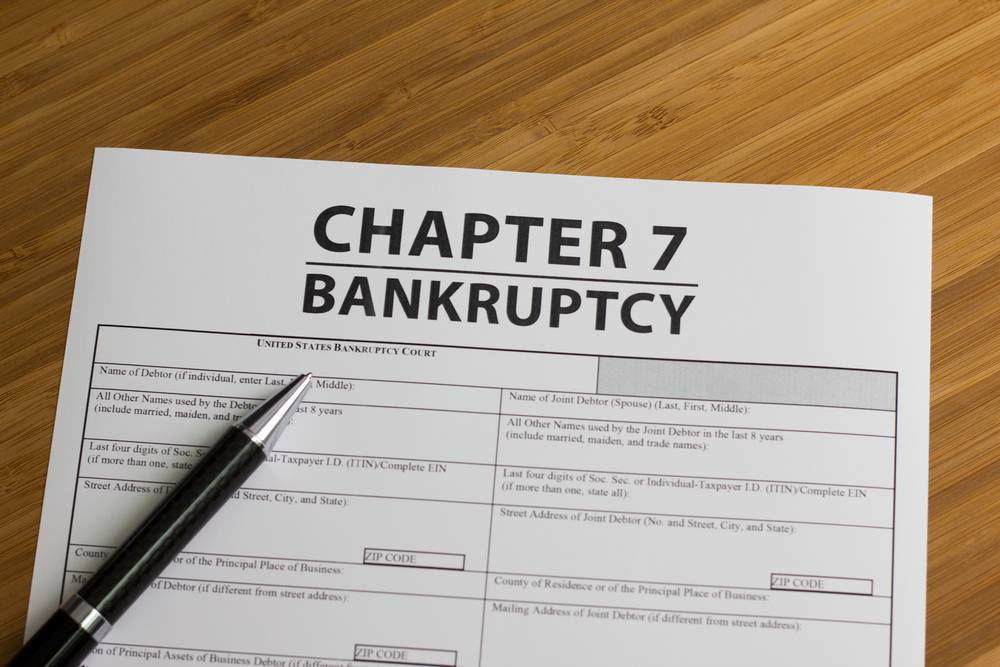Who Can Declare Chapter 7 Bankruptcy


Written by Robert DeMarco
In case you are considering declaring Chapter 7 bankruptcy, it is essential to understand who is eligible. This type of bankruptcy allows for the discharge of unsecured debts, such as credit card debt and medical bills. However, not everyone can declare Chapter 7 bankruptcy. To be eligible, you must satisfy specific requirements established by the Bankruptcy Code. Please keep reading to learn more about who can declare Chapter 7 bankruptcy and what it entails.
What Is Chapter 7? How Does It Work?
You will need to fill out forms detailing your income, expenditures, assets, debts, and other information. These forms will be submitted to the bankruptcy court. You will also need to submit your most recent tax returns and payslips if you are employed.
A bankruptcy trustee will review all the documents. They will also attend your 341 Meeting of Creditors, where they will ask you basic questions about financial matters.
You’ll receive a notice from the court in the mail letting you know that you have been granted a bankruptcy exemption. Most people are honest and complete their bankruptcy forms. This allows them to have their petition approved by the court and any eligible debts wiped out.
Who Qualifies For Chapter 7 Bankruptcy
Chapter 7 bankruptcy can eliminate many types of unsecured debt. However, not everyone can file Chapter 7 bankruptcy. These are the requirements for Chapter 7 bankruptcy.
- Your monthly income must be less than the median income of the same-sized household in your area for the past six months. Otherwise, you will need to pass what is known as the means test. This test measures your ability to pay partial repayments to unsecured creditors and determines your disposable income. Don’t worry if you fail to pass the means test. You might still be eligible for Chapter 13 bankruptcy.
- You cannot file for Chapter 7 bankruptcy within the past eight years.
- You cannot have filed Chapter 13 bankruptcy within the past six years.
- You must wait at least 181 days if you tried to file Chapter 7 or 13 bankruptcy, and your case is thrown out.
- You must complete a credit counseling course (individual or group) offered by a credit counseling agency within 180 calendar days to file for bankruptcy.
- A judge can throw out your bankruptcy case even if you are eligible. One example is when you accumulate credit card charges to declare bankruptcy to avoid paying the debt.
Who Does Not Qualify For Chapter 7 Bankruptcy
The following are a few of the criteria to disqualify for Chapter 7 bankruptcy:
#1. Your Income Is Too High
To determine if a debtor is eligible for Chapter 7, it must be determined if their income is too high. Means-testing is used to determine whether a debtor is eligible for Chapter 7. The first part of this test requires that the debtor compare their monthly income, the average of their six months before filing bankruptcy. This comparison must be made with the state’s median income.
These are the eligible monthly incomes:
- Salary, tips, bonuses, and overtime pay.
- Gross income from a profession, business, or farm
- Dividends, interest, and royalties
- Rents and income from real estate
- Spousal or child support is required regularly.
- Unemployment compensation
- Retirement income and pensions
- Workers’ compensation
- Annuity payments
- State disability insurance
The income tax refunds received, and the payments made from Social Security retirement benefits are not required to be included by a filer.
The debtor may file for Chapter 7 if the monthly income of the filer is at least equal or lower than the state’s median. To qualify for Chapter 7, a filer with a household income exceeding the state’s median income must pass the second section of the means test.
#2. You Can Repay Some Debt
If a filer’s income is higher than the state’s median income, the filer must calculate their disposable income after paying monthly expenses such as rent or food. This will determine if the filer can repay some of their creditors through a Chapter 13 plan.
The court will reject a Chapter 7 filing if the filer has less than a certain income to pay unsecured creditors. Chapter 7 eligibility rejects a Chapter 7 filing if the filer has a minimum of $166.66 a month to continue paying a secured creditor or $290 per month to pay unsecured creditors for three consecutive months.
#3. Debt was previously discharged in bankruptcy
A filer who has discharged debts under Chapter 7 bankruptcy within the last eight years or under a Chapter 13 bankruptcy in the past six years is not eligible for Chapter 7. The debtor must file for bankruptcy within the previous six years to qualify for Chapter 7 bankruptcy.
#4. An Ex-Bankruptcy Case Was Discredited Within the Last 180 Days
A filer is not eligible if a Chapter 7 or Chapter 13 bankruptcy case was dismissed within the last 180 days.
- The filer broke a court order.
- The bankruptcy case before was deemed fraudulent or abusive by the court.
- After a creditor requested that the court lift the automatic stay, the filer asked for a dismissal to avoid foreclosure, eviction, or repossession.
The Chapter 7 trustee is trying to recover property fraudulently transferred into an ex-spouse’s name after filing Chapter 7 bankruptcy.
#5. The Debtor Failed To Meet The Credit Counseling Requirements
A debtor must enroll in credit counseling within 180 days of filing for Chapter 7—trustee’s office. Credit counseling helps the debtor determine if there are other options than bankruptcy. Except for an exception, all debtors must take part in credit counseling. All debtors must participate in credit counseling except for mental incapacitation, physical disability, and active military service. After counseling is completed, the debtor will be issued a certificate of completion that he or she can submit to the bankruptcy court for filing. Chapter 7 debtors may be able to receive an extension if their spouse or dependent minor children are mentally or physically incapacitated.
#6. The Debtor Defrauded Creditors.
If it is found that the bankruptcy court has been attempting to defraud creditors, a bankruptcy court can discharge a bankruptcy case. A debtor’s actions within the first few years after filing bankruptcy could be considered fraud.
- The debtor transfers the property to family and friends
- The debtor damages or mutilates property
- The debtor purchases luxurious items
- On a credit application, the debtor lies about his income and his debts
Filer signs bankruptcy papers under “penalty to perjury .”False information can lead to dismissal of the case and possible charges of fraud or perjury against the court.
#7. The Chapter 7 Filer Owes Back Taxes
Every Chapter 7 filer with taxable income must file a separate Chapter 7 tax return. Suppose the filer does not think they have to pay taxes. In that case, it is best to consult a professional instead of filing incorrectly, resulting in criminal charges or causing problems during Chapter 13 bankruptcy.
How Can I File Chapter 7 Bankruptcy?
The process can be completed in six months. There are several steps you will need to take.
Pre-file bankruptcy counseling must be completed by a qualified nonprofit credit counseling agency within the 180 days preceding filing.
- Locate an attorney: Before you start to look at the forms necessary to file Chapter 7, a qualified bankruptcy lawyer can help. Although it is difficult to pay a lawyer if you need debt relief, this is not an easy task. Incorrect or missing paperwork could result in your case being dismissed or thrown out.
- Filing paperwork: Your attorney can help you file your petition and other paperwork. It’s up to you to collect all documentation about your assets, income, and debts. This is when an automatic stay takes effect. Most creditors cannot sue you, garnish wages, or contact you for payment.
- Trustee assumes control: After your petition has been filed, a court-appointed trustee will take over the management of the bankruptcy process.
- Meeting of creditors: The trustee will organize a meeting between your lawyer and creditors. The trustee will ask questions about your finances, bankruptcy forms, and other matters.
- The trustee will determine your eligibility: After reviewing your paperwork, the trustee will confirm that you are eligible for Chapter 7.
- Handling of non-exempt property: The trustee decides whether assets not exempt should be sold so that proceeds can go to creditors. If your state has an exemption limit, jewelry and equity in your home or car are exempt. However, most Chapter 7 cases are “no asset” cases in which there are no exempt items to liquidate.
- Secured debts: The property used as collateral can be returned to the creditor to resolve secured debts. You may be able to redeem the collateral (pay the creditor the current value) or reaffirm your debt (arrange for the debt to be exempted from bankruptcy and continue paying it back).
- Education course: You will need to complete a financial education course through a nonprofit credit counseling agency before your case can be discharged.
- Discharge: Your case will be dismissed within three to six months of filing it. This means that any eligible debts can be forgiven. Your case will be closed shortly after that.
If I file For Chapter 7 bankruptcy, Can I Keep My Property?
95% of Chapter 7 bankruptcy cases allow people to keep all their property. According to the Bankruptcy Code, exemptions will enable you to keep cash, clothing, furniture, and cars. Exemption limits allow you to keep up to a dollar amount.
Your state will determine which exemptions you can use to keep your property. Many states offer wildcard exemptions that allow you to keep any property less than $10,000. The federal bankruptcy exemptions are available in 19 states. The wildcard ceiling is just over $10,000. This means that property worth less than $10,000 can be kept.
Chapter 7 is sometimes called liquidation bankruptcy. The trustee can seize your property if it exceeds the exemption limit. This will allow you to repay your creditors. However, liquidation is rare.
Even though Chapter 7 is called liquidation bankruptcy, you will not lose your assets once exemptions are applied.
Chapter 7 Lawyer in Plano, Texas
The DeMarco Mitchell, PLLC team is here to help. If you need a bankruptcy lawyer in Plano, TX, or the surrounding areas, please give us a call today at (972) 578-1400. You can request an appointment online at our website if that’s more convenient for you! We’ve been working with people struggling financially for years, and we know what it takes to get your life back on track.
Related Articles
Related
Chapter 7 Attorney: A Guide to Navigating Bankruptcy and Choosing the Right Legal Representation
Chapter 7 Attorney: A Guide to Navigating Bankruptcy and Choosing the Right Legal Representation Are you considering filing for Chapter 7 bankruptcy? Navigating through the complexities of bankruptcy law can be overwhelming, but with the help of a knowledgeable...
Navigating Chapter 7 Bankruptcy in Texas: Key Roles of a Texas Bankruptcy Lawyer and When to Consult One
Navigating Chapter 7 Bankruptcy in Texas: Key Roles of a Texas Bankruptcy Lawyer and When to Consult One Are you grappling with overwhelming debts and contemplating bankruptcy as a possible way out? Are you unsure about the proceedings and when to take that pivotal...
Understanding the Different Types of Bankruptcy for Individuals in Texas
Understanding the Different Types of Bankruptcy for Individuals in Texas If you're struggling with debt and considering bankruptcy as a solution, it's essential to understand the different types of bankruptcy available for individuals in Texas. At DeMarco Mitchell,...


